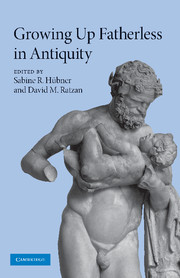Book contents
- Frontmatter
- Contents
- List of figures
- List of tables
- List of contributors
- Acknowledgments
- Note on abbreviations
- INTRODUCTION
- 1 Fatherless antiquity? Perspectives on “fatherlessness” in the ancient Mediterranean
- PART I COPING WITH DEMOGRAPHIC REALITIES
- PART II VIRTUAL FATHERLESSNESS
- PART III ROLES WITHOUT MODELS
- PART IV RHETORIC OF LOSS
- Bibliography
- Index
1 - Fatherless antiquity? Perspectives on “fatherlessness” in the ancient Mediterranean
Published online by Cambridge University Press: 30 July 2009
- Frontmatter
- Contents
- List of figures
- List of tables
- List of contributors
- Acknowledgments
- Note on abbreviations
- INTRODUCTION
- 1 Fatherless antiquity? Perspectives on “fatherlessness” in the ancient Mediterranean
- PART I COPING WITH DEMOGRAPHIC REALITIES
- PART II VIRTUAL FATHERLESSNESS
- PART III ROLES WITHOUT MODELS
- PART IV RHETORIC OF LOSS
- Bibliography
- Index
Summary
The modern study of the family was born in crisis, a response to the unmistakable and disturbing changes in family life precipitated by the Industrial Revolution. Although research into the family has changed profoundly in aim and method since the early nineteenth century, the original, underlying sense of crisis has persisted, reinterpreted with every succeeding generation. In the 1990s the crisis in the family was articulated and popularized as a crisis of “fatherlessness.” In the United States one critic thus decried the rise of a “culture of fatherlessness,” fearful that fatherhood itself was close to extinction in a newly “fatherless America.” Fatherlessness, however, is not a uniquely American condition: similar concerns have recently been raised in Western Europe.
Any discussion of fatherlessness fundamentally resolves into a debate over the importance of household form and composition. Household form greatly affects family relations and the interdependency of kin members, helping to define the roles each member plays in the family. The sudden disappearance of any family member necessarily results in multiple dislocations and readjustments, particularly when that member is as central to a family as the father. Father-absence was, in fact, the point of departure for much of the twentieth-century study of the father, a field that blossomed in recent decades with studies of fathers and fatherhood from a variety of perspectives, multidisciplinary and multicultural. Indeed, for many scholars the absence of the father remains an important, even defining, aspect driving contemporary family dynamics.
- Type
- Chapter
- Information
- Growing Up Fatherless in Antiquity , pp. 3 - 28Publisher: Cambridge University PressPrint publication year: 2009
- 28
- Cited by



